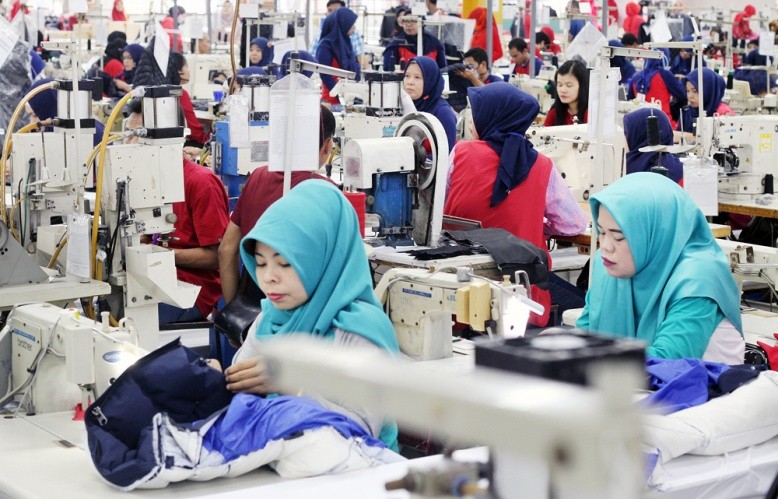1.2 million Indonesian workers furloughed, laid off as COVID-19 crushes economy
Over 1.2 million workers from 74,439 companies in both the formal and informal sectors have either been told to stay home or been laid off as a result of the pandemic.
Change Size
 Workers sew garments at a factory in Bogor, West Java, in September 2018. The COVID-19 crisis is expected to wipe out 6.7 percent of working hours globally in the second quarter of 2020, equivalent to 195 million full-time workers, according to an International Labor Organization (ILO) report published on Tuesday. (Antara/Yulius Satria Wijaya)
Workers sew garments at a factory in Bogor, West Java, in September 2018. The COVID-19 crisis is expected to wipe out 6.7 percent of working hours globally in the second quarter of 2020, equivalent to 195 million full-time workers, according to an International Labor Organization (ILO) report published on Tuesday. (Antara/Yulius Satria Wijaya)
T
he COVID-19 pandemic, which is spreading like wildfire in Indonesia, has taken not just lives but also the earnings of millions of workers, one month after the government announced Indonesia’s first two confirmed cases of the virus.
Jumari, a 61-year-old who works in a shoe factory and lives in Jakarta, has not received his daily wages for over two weeks and will likely not receive his April salary at all. The factory has been shut, and he and his colleagues had been told to stay home.
His boss claimed the dismissal was “not the company’s will” given that COVID-19 had affected almost all of the world’s countries, Jumari said. He is now depending on last month’s wages to pay for his family’s daily needs.
“The government said it would disburse funds to those who are affected by COVID-19. What’s the regulation and how do we get it so that we can have something to eat?” he said recently. “We’re not expecting anything grand."
Read also: Thousands laid off, forced to take unpaid leave in Jakarta as companies hit hard by COVID-19
The COVID-19 outbreak has devastated workers’ hours and earnings. Businesses have shut down factories and furloughed or laid off their employees as a result of low demand and the call for social distancing.
Over 1.2 million workers from 74,439 companies in both the formal and informal sectors have either been told to stay home or have been laid off as a result of the pandemic, Manpower Ministry data showed on Tuesday.
The Confederation of Indonesian Workers’ Unions (KSPI) released a statement over the weekend saying its worries about massive layoffs had come true, Jakarta Manpower Agency data that at least 162,416 workers in the capital city alone had reportedly been laid off or furloughed.
In a separate statement last month, KSPI suggested an alternating shift system or partial dismissal in a bid to keep production running without laying off workers. In the case of a partial lockdown, it also urged employers to send their employees home without cutting their salaries.
Manpower Minister Ida Fauziyah urged all industry players to make layoffs their last choice during the pandemic. Instead, companies could lower salaries or reduce working days and hours, among other alternatives.
“The situations and conditions are indeed challenging, but this is the moment for the government, business people and workers to work together and find a solution to mitigate the impact of COVID-19,” Ida said in a teleconferenced briefing on Wednesday.
Read also: Five more months to business as usual: Business players
Statistics Indonesia data shows that out of the country’s workforce of 133.56 million, 7.05 million are unemployed and more than 55 percent of those employed work in the informal sector.
Indonesian Chamber of Commerce and Industry (Kadin) vice chairman for manpower and industrial relations Anton J. Supit said on March 20 that companies had been implementing alternating shifts, reduced working hours and had offered "voluntary layoff" packages to keep layoffs a last resort during the crisis.
The COVID-19 crisis is expected to wipe out 6.7 percent of working hours globally in the second quarter of 2020, equivalent to 195 million full-time workers, according to an International Labor Organization (ILO) report published on Tuesday. The ILO described the pandemic as “the worst global crisis since World War II”.
The ILO stated that there was a high risk that end-of-year worldwide job losses would be significantly higher than the initial ILO projection of 25 million, depending on future developments and policy measures.
“Workers and businesses are facing catastrophes in both developed and developing economies,” said ILO director-general Guy Ryder. “We have to move fast, decisively and together. The right, urgent, measures could make the difference between survival and collapse.”
The government has announced plans to spend Rp 405 trillion of additional state expenditure to fund health care, social spending and business recovery programs. Of the amount, Rp 110 trillion has been allocated for social safety net programs, including Rp 20 trillion for a pre-employment card program to cover 5.6 million laid-off workers and Rp 150 trillion for a small and medium business economic recovery program.
Airlangga University labor law expert M. Hadi Subhan said the current economic stimuli and the preemployment card launched last month were insufficient to cushion short-term shocks in the labor sector. He advised the government to provide cash compensation to workers who suffered income loss to avoid social unrest in the short term.
Read also: 70 million informal workers most vulnerable during pandemic
“[If workers are not compensated], I predict that the social costs will be high. Riots, looting and burning public infrastructure could occur, just like during the 1998 crisis,” said Hadi.
As the government scrambles to disburse social aid, small business owners and vulnerable workers have to fight by themselves for sustenance.
While waiting for the COVID-19 outbreak to pass, travel agency owner M. Sela Sulyadi, who lives in Lombok, West Nusa Tenggara, has been forced to furlough his employees while continuing to help them pay for basic needs such as electricity, water and rice.
“Like it or not, the reality is that income from tourism will be low for the next few months. And we have to accept that,” he said.









